#yue boatman song
Explore tagged Tumblr posts
Text
listennn im not saying we should make the boatman song about ying'er
BUT WE SHOULD DEFINITeLY MAKE THE SONG ABOUT YING'ER LIKE
#it could be done in a hanzhou way or a hanwenzhou way#unrequited OR requited#HEAR ME OUT#what if zzs and wkx overhear hy singing the yue boatman song while he's doing chores or whatever idk#and they're like 'OMG' 😳#and then they must tease him about who his song's about and gib kith or sth iDK IM NOT A WRITER I JUST#I JUST LIKE MY SCENARIOS#COULD THIS BECOME A HANWENZHOU THOUGHT FO THE DAY??? WE JUSTDON'T KNOW#is this disrespectful??#am i being disrespectful??? if i am i'm sorry ;A;#birb still says#BIRB SHUT IT#U HAVE SQUAWKED ENOUGH FOR ONE DAY THAT'S IT >:V#(if i yell at myself im SURE i can correct my behaviour thats how discipline works right????)#yue boatman song#hanzhou#hanwenzhou#this is baasically a note to myself at this point so i don't forget 🤣🤣
17 notes
·
View notes
Note
Hi! I wanted to know if the lyrics for all the songs in withering lotus and rotting waters were written by you? And if you would let me use them someday if they are yours. Not for another written work or anything like that but to use them for a song?
Hello! Yes, all the lyrics are written by me, except for the verse of Queen's "My Fairy King" in Withering Lotus, chapter 7, and the "Song of Yue Boatman" in Rotting Waters, chapter 4.
And yes, you can musicalize them as not-for-profit/non-commercial projects! Preferably as metal songs, but if that's not your genre, it's fine too. If you do it, please send me a link, I'd love listening to them 🤩
0 notes
Text
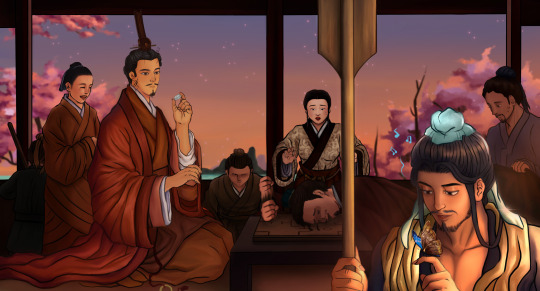
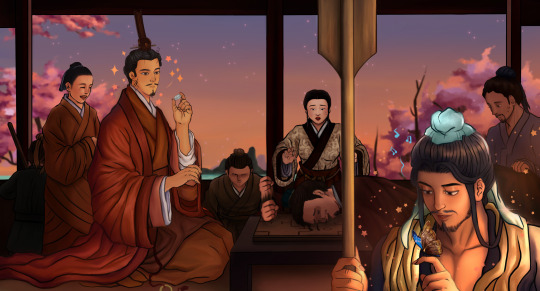
Song of the Yue Boatman
今夕何夕兮, What evening is this
搴舟中流。 that I take a boat into the stream?
今日何日兮, What day is this
得與王子同舟。 that I share a boat with my prince?
蒙羞被好兮, Shy am I for having taken to you,
不訾詬恥。 I fear not the shame of denunciation.
心幾頑而不絕兮, My longing is intense and without let,
得知王子。with thoughts only for my prince.
山有木兮木有枝, The mountains have trees, the trees branches,
心悅{君兮君不知。 my heart has spoken to my lord, my lord does not understand.
#art#artists on tumblr#hanfu#warring states period#song of the yue boatman#idk what else to add#my art#prince of E#yue boatman#zhou dynasty
70 notes
·
View notes
Text
Naturally I dived into this and it seems to be Song of the Yue Boatman. It’s from a story with a story, but although the prince doesn’t understand the Boatman’s song at first, he asked for an interpretation of the song. As soon as he heard it he grabbed the boatman and covered him with his fancy embroidered blanket and they totally did it. So much for pining. Also in the outer story, some guy uses this story to convince a sexy lord to hold his hand despite their status difference.
The song in the story is transcribed using Chinese characters. Linguist Wei Qingwen was able to come up with an interpretation of the song’s meaning based on the sound those characters had in Old Chinese and several languages in the Tai language family. Another linguist, Zhengzhang Shangfang, produced a version written in old Thai since that would be the closest approximation to the original language.
Anyway, here’s a version!
youtube
Just learned that there is a 2,500 years old song sung by a gay boatman who fell in love with a prince. The language is ancestor of Thai language, and I can understand some words and can make sense of what the song is about;

According to source, a boatman row the prince across the water, and the boatman suddenly sing a song. The prince does not know this language, but wrote down what he heard. It was never deciphered until last century, when it was revealed to be a love song of the boatman;
"we meet in a happy dusk, I'm good at rowing, I'm a lowly boatman and you're a prince. I'll hide this love forever in my heart"
Imagine your pinning being immortalised in song that people only deciphered 2500 yrs later. He almost did hid his feeling forever in his heart though! 2,500 years is close to forever.
We gays have always been the same, it seems like.
4K notes
·
View notes
Text
References and Allusions to Male Same-Sex Relations in Chinese Literature
I am tired at this point of reading and watching Danmei/Dangai and be exposed to the same “cut sleeve” reference to allude to male same-sex attraction and relationships.
Don’t get me wrong, I thank the creative team and the writers for finding such a unique (?) way of bypassing censorship but there are so many more literary and historical references that they could use to allude to same-sex attraction. I’m kinda over the same old “Cut Sleeve” reference. 😖
Here are some of the most popular allusions used by writers in Chinese literature to reference male same-sex desire.
The Four Male Love Icons of Chinese Literature
I’m pretty sure that, if you are into Chinese history, folk, literature, etc, you have heard of the four beauties of ancient and imperial China. You have the four most beautiful Chinese women and the four most handsome Chinese men.
The same thing is true for the tradition of male same-sex love. Those are:
Mizi Xia (彌子瑕) and Duke Ling of Wey (衛靈公)
Lord Longyang (龍陽君) and King Anxi of Wei (魏安僖王)
Prince Zixi, Lord of È (鄂君子皙), and the Yue man (越人)
Emperor Ai of Han (漢哀帝) and Dong Xian (董賢)
Other literary allusions include:
Pan Zhang (潘章) and Wang Zhongxian (王仲先)
Lord Chan of Anling (安陵君) and King Xuan of Chu (楚宣王)
Hu Tian Bao (胡天保) as Tu’er Shen (兔兒神)
The four revered bottoms of Chinese literature and history are:
Mizi Xia (彌子瑕)
Longyang (龍陽君)
Dong Xian (董賢)
Chan (纏), Lord of Anling (安陵君)
If you ever come across a poem or prose that mentions any of those names to refer to a male beauty, just know that it’s an allusion to their stories. They were considered the peak of bottom literary reference.
The Passion of the Half-Eaten Peach (餘桃癖) 🍑
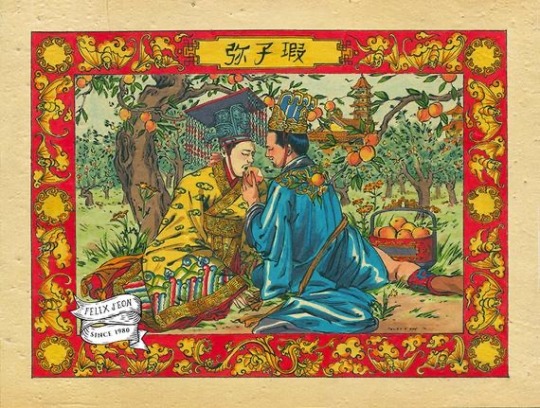
Art above credit: Felix d’Eon (@FelixdEon on Twitter)
The story of Mizi Xia and Duke Ling of Wey (534-493 BCE) takes place in the Zhou dynasty in the state of Wey (not to be confused with the other Wei). It was recorded by Han Fei (韓非) in the legalist classic Han Fei Zi (韓非子). The story goes as follows:
Squire Mi gained favor with Duke Ling of Wey due to his beauty. There is a law in the land that states only the duke himself can ride in the duke’s carriage and that, if someone else dares to do the same, they will have their feet cut off. When squire Mi learned that his mother was sick, he took the ruler’s carriage and rushed to visit her. The duke, far from reprimanding him, praised Mi’s filial piety and his willingness to risk his feet be cut off to visit his sick mother. On another occasion, Mi and the ruler were strolling through an orchard. He got a hold of a peach, started eating it, and, upon noticing how sweet and delicious it was, he stopped eating and gave the other half to duke Ling. He praised Mi’s attention and lack of regard for his own appetite in order to please his ruler. When Mi’s looks started to wane, the duke’s love did the same. Then, the squire was accused of a crime and the duke stated it was not surprising since he had broken the law before to ride in the ruler’s carriage and disrespected him by giving him a half-eaten peach to eat.
Han Fei recorded this story as a cautionary tale of what happens when one depends on the fickle nature of their lord for favor rather than one’s own merits. One day, you are praised and, the other, you are labeled a criminal and beheaded. From this story, we get “the passion of the shared peach (分桃癖)” and “the passion of the half-eaten peach (餘桃癖)” allusions to male homosexuality.
The Passion of Longyang (龍陽癖) 🐠
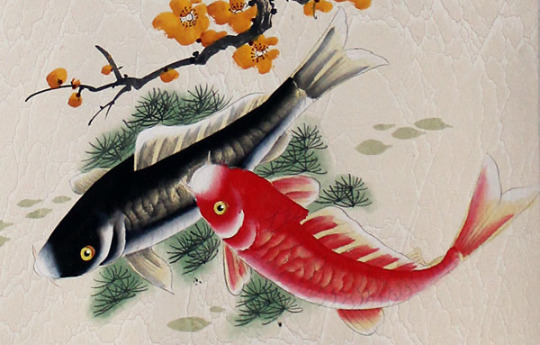
The next story comes from the Annals of the Warring States, Zhan Guo Ce (戰國策), in the section of the “Strategies of Wei”, Wei Ce (魏策). There is not one author signaled out as the sole writer and it’s theorized that the annals were written by multiple people. This Zhou dynasty story goes as follows:
Lord Longyang and the King Anxi of Wei went fishing on the ruler’s boat. The favorite, at first, was delighted at catching so many fish in a row. However, after he caught a big one, he started to sob and lament. The king asked his favorite why he was crying to which Longyang expressed sadness at the realization that, upon catching the latest fish, due to its incredible size and desirability, he wanted to throw away the previous ones he had caught. Longyang further confessed that he was afraid that the ruler would one day grow tired of him upon learning of other beauties and would discard him away in the same manner he had planned to do with the previous fish he caught before. With an air of resolution, the king Anxi declared that anyone who mentioned other beauties in his presence would be executed along with his entire family/clan.
This dramatic story serves as a way to illustrate how male favorites in ancient China that obtained favor at court and, with it, enormous privilege, would try to hold on to those positions as much as possible. From this story, is where we get the “Passion of Longyang (龍陽癖)” and “a better catch” allusions that are included in poems regarding male love. The former, most notably, in one of the Emperor Jianwen of Liang’s (梁簡文帝) love poems to his favorite.
Song of the Yue Botman (越人歌) 🎶
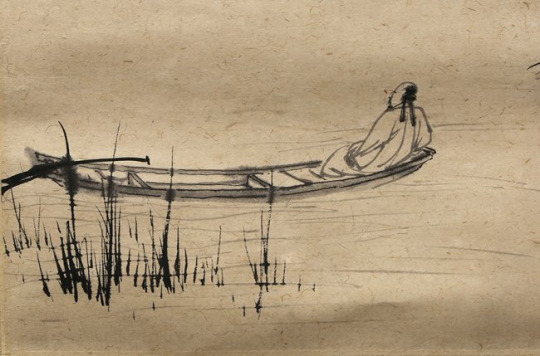
The following is an extremely interesting story. The earliest text translated into Chinese from a foreign language that we know of comes from “Song of the Yue Boatman” (越人歌). It is a poem of unknown authorship and origin that details the pleasure the singer feels at having met the prince (Lord of È) for the first time. What makes it special is that it’s the only written account we have of the Yue language spoken by the Yue people who are an ethnic group who lived to the South of the Yangtze River. The song isn’t written using the Yue language itself, instead, compiler Liu Xiang (劉向) in his book, Garden of Stories (說苑), used Chinese characters to write down the sound of the words. In Garden of Stories, in the section, “Virtuous Speech” (善說), Liu Xiang details the story of official Zhuang Xin (莊辛) and Lord Xiang Cheng of Chu (楚襄成君). The story goes as follows:
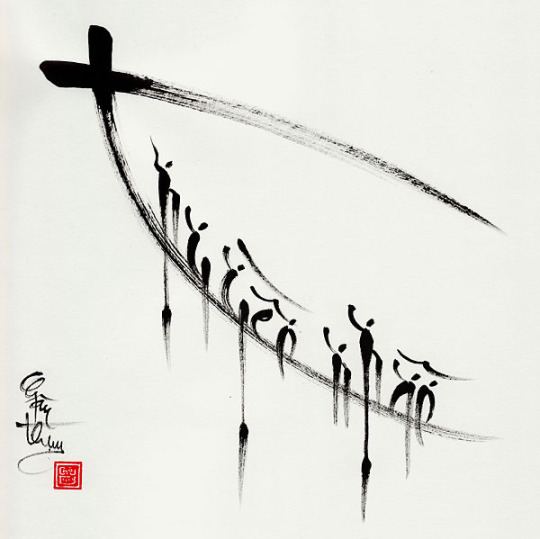
Soon after being enfeoffed (being given land), Lord Xiang Cheng visited his lands decked out in precious garments and sporting a jade sword. Upon arriving at a river, his attendant asked whether there was someone who could help Lord Xiang Cheng cross the river. Official Zhuang Xin, who grew enamored with the sight of his lord in finery, stepped forward and said he was willing to help in exchange for the lord to let him hold his hand. Xiang Cheng was speechless and disgruntled due to the lack of propriety the lower official showed by asking to touch the hand of a man much higher in rank. However, Zhuang Xin asked his lord whether he had heard of the story of the Lord of È and his boatman.
Here is when the author introduces a story within a story.
Lord of È was traveling in his barge when he heard one of his boatmen sing in a foreign language. Intrigued by this, he asked one of his servants to fetch an interpreter. After hearing the translation of the song, the lord grew endeared towards the boatman, hugged him, and covered him in his embroidered quilt (had sex). Once the tale was over, the official Zhuang Xin asked his lord how could it be possible that he thinks he sits higher than the Lord of È enough to refuse a humble official his hand when the Lord of È, who is a prince, had “embraced” (had sex) a low boatman.
Although the English word used is boatman, due to the Chinese language not being gendered, the gender of the boatman is not explicitly mentioned. Although the character 人 can be used to refer to a man, its principal meaning is person or people. Therefore, 越人 is more closely translated as Yue person/people. As such, there have been scholars who believe that the song is most likely sung by a woman and not a man. I don’t agree with this interpretation, however, for multiple reasons.
The first is the context. Liu Xiang added the song, which was written centuries before he was born, to his chapter on eloquent speeches as a tool the official Zhuang Xin used to convince his lord to let him hold his hand. Zhuang Xin found Xiang Cheng attractive and wished to physically express that attraction. Thus, he used the song and the story of Lord of È as a precedent to convince his lord that a low ranking man could take the initiative to begin physical contact with another of much higher rank. If Liu Xiang didn’t perceive the boatman to be male and his relationship to the Lord of È to closely mirror that of Zhuang Xin and Xiang Cheng, then he wouldn’t have included it in the first place.
The second reason why I don’t think that the Yue boatman was a woman is because Chinese scholars who read the tale back in its original form and with the same historical and lexical sensibilities, considered the boatman to be a man. Multiple Chinese writers included references to the “Song of the Yue Boatman” story with Lord È in their own writings to explicitly symbolize male love such as Ming dynasty scholar Feng Menglong (馮夢龍) in his History of Love (情史) anthology, Emperor Jianwen of Liang’s poem to his favorite catamite (孌童), Liang dynasty poet Liu Zun (劉遵), and influential Qing dynasty poet Yuan Mei (袁枚). They have all used fragments of the story such as the expression “embroidered quilt” in conjunction to Lord of È’s name as well as other male-love allusions in their poems. This indicates that Chinese scholars themselves, even those who lived closer in time with Liu Xiang, interpreted the tale and the boatman to be symbols of male love. From this story we get the “embroidered quilt” expression, Lord of È, and his boat as male love allusions.
The Passion of the Cut Sleeve (斷袖之癖)✂️
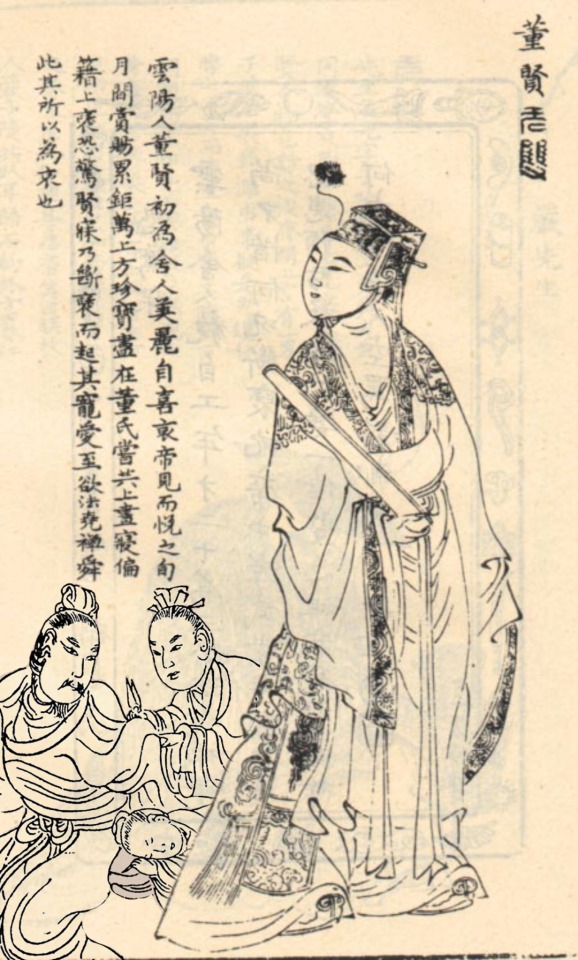
The next story was featured in History of the Former Han (漢書), also knows as The Book of Han, by Ban Gu (班固) in Volume XI, “Annals of Emperor Ai” (哀帝紀). Dong Xian’s autobiography and the story are written on the section dedicated to favored courtiers.
Emperor Ai of Han favored greatly a minor official by the name of Dong Xian and they often slept together. One afternoon, after waking up from a nap, the emperor noticed that one of his sleeves was caught under the head of Dong Xian who kept sleeping beside him. Rather than disturbing his lover’s sleep, the emperor decided to cut off his sleeve. From this story we get the terms, “cut-sleeve (斷袖)” and “the passion of the cut-sleeve (斷袖之癖)”
That’s it, that’s the story. Compared to the others, I don’t understand why it’s so iconic and well-known, probably because Dong Xian’s biography as a male favorite was much more detailed than others contained in the book.
Mount Luofu Joint Burial (羅浮山合葬) ⛰
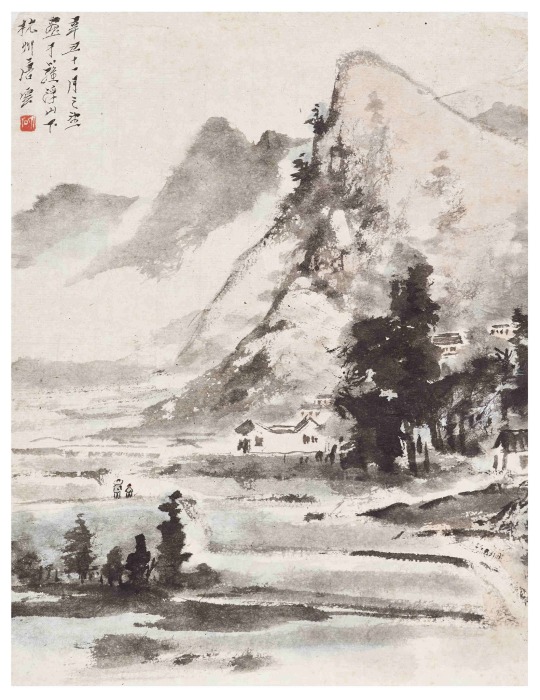
This tale originates from the Three Kingdoms and Six Dynasties period in Chinese history and was recorded in a compilation titled Anthology of Tales From Records of the Taiping Era (太平廣記) by Song dynasty scholar Li Fang (李昉). The tale goes as follows:
A beautiful and poised scholar by the name of Pan Zhang drew the attention and admiration of others, not only due to his bearing but also due to his talent as a teacher and writer. Wang Zhongxian of the state of Chu came to know of the scholar’s reputation and requested to become his student and learn together. Upon meeting for the first time, they fell in love at first sight. Afterwards, they decided to live together in the same home where they shared the same sheets and pillow while being intimate with each other. They grew so close to one another that people would say they loved each other as much as husband and wife. After they died, the townsfolk buried them together at Mount Luofu (羅浮山). On the peak, there grew a tree soon after with green leaves and long branches that embraced each other. Considering this a miracle, the townsfolk started to call the tale the “Shared Pillow Tree”.
Such a wonderful and happy story between teacher and student! One of the few ones with a happy ending and overall positive feelings in Chinese literature. It reminds me of an alternate reality 2ha where Meatbun doesn’t rip out our hearts. Also, many of these stories of male love either take place in Wei or Chu; interesting…From this tale, we get the “shared pillow tree” reference.
The Yellow Springs (黃泉) 🔥
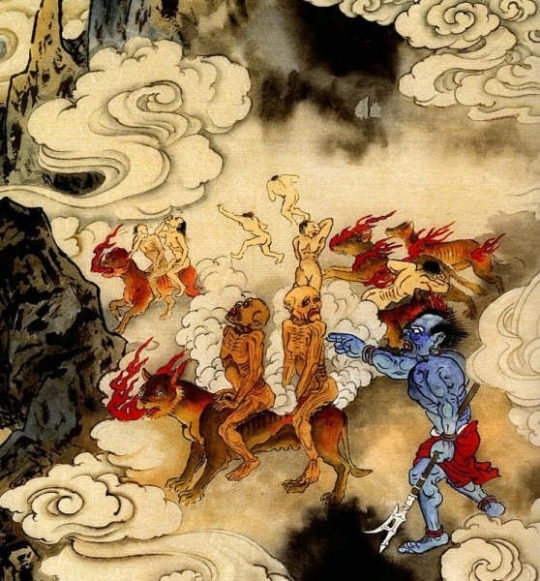
Another story that comes from the Annals of the Warring States and takes place in the state of Chu (again) is the one of Prince Chan or Tan (壇), Lord of Anling, and King Xuan of Chu. This specific account is mentioned in the section of “Strategies of Chu”, Chu Ce (楚策), and goes as follows:
Prince Chan or Tan, was favored by King Xuan of Chu. However, as he grew older, he became increasingly worried that he may lose favor once the physical signs of aging started to show. In an attempt to establish a deeper connection with his king, he consulted with the ruler’s advisor, Jiang Yi (江乙). The older man told him that his position in Chu was precarious because he had no family members in the state, nor had arisen at court due to talent. Instead, he received a high salary and others were made to bow before him when he walked past simply because he received the king’s favor. However, the position of a favorite, just as that of a concubine, was never assured. Jiang Yi proceeded to advise Prince Chan that what he needed to do was to say that he would follow the king to the afterlife. Essentially, to claim that he would sacrifice himself for the ruler. Three years passed and Chan had yet to do what Jiang Yi told him because the opportunity to say something like that had not yet arrived. One day, the king went hunting. Upon shooting an arrow at a great distance that landed in an ox’s head, the king, pleased with his accomplishment, asked who could possibly share his joy 10,000 years and 1,000 autumns from then. Seizing the opportunity Chan answered that he was willing to go to the afterlife (黃泉) and sacrifice himself for his king. As a result he was promoted and given the lands of Anling. From that day on, the people of Chu held him in great esteem.
The story features, both a cautionary tale and a lesson on the importance of listening to advice and waiting for the right opportunity to seize the moment. From this story we get “Anling” as term used to allude to same sex love but also to symbolize devotion, self-sacrifice and loyalty.
Rabbit God (兔兒神)🐇

Another story that originates on the south of China is that of Hu Tianbao, also known as the Rabbit God (or deity). The tale where he’s featured and that gave rise to his legend was compiled by influential Qing dynasty writer and scholar Yuan Mei in his collection of supernatural stories titled What the Master Would Not Discuss (子不語). Despite it being compiled and published in 1788, the tale has its origins as part of Fujian Province (福建省)‘s oral tradition. It goes as follows:
During the Qing dynasty, there lived a handsome provincial official in Fujian. A lowly soldier, by the name of Hu Tianbao, became instantly attracted to him. He followed the official wherever he went, even to other districts. After a while of being stalked, the official grew increasingly worried but dismissed it. While the official went to the toilet, Tianbao hid nearby behind some bushes in order to get a glance at the official’s buttocks. However, Tianbao was caught and interrogated. He confessed his love, attraction, and admiration for the official but the latter was disgusted by Tianbao’s affection and wanted none of it. He condemned the soldier to death. A month later, Tianbao appeared as a rabbit at night in the dream of one of the villagers of his hometown. Although resigned to his fate and agreeing that the punishment of death was just, Tianbao declared that his actions were born from a pure feeling and that love between men should not be condemned. He asked the man to build a temple in his honor from which he would help men find a male significant other. The temple was erected and became so popular in Fujian that the Qing authorities targeted it for regulation.
From this story, we get the terms “Cult to Hu Tianbao”and “the Rabbit God”. Rabbits were used before this story was even compiled in late imperial China to refer to homosexuals in general. If you are ever wondering, “what is up with all of the rabbits in Danmei/Dangai media?” There you go, now you know.
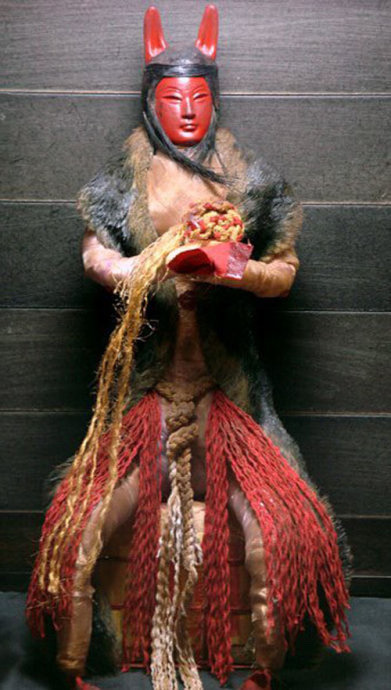
Other literary allusions to male love and sex include:
Mandarin Ducks (鴛鴦) 🦆
Although these animals have been used throughout Chinese literature and history as symbols of love in general, both same-sex and heterosexual, it was first used to symbolize “fraternal love”. The ancient Chinese considered mandarin ducks to be symbols of love and loyalty because they believed the animals mated for life.
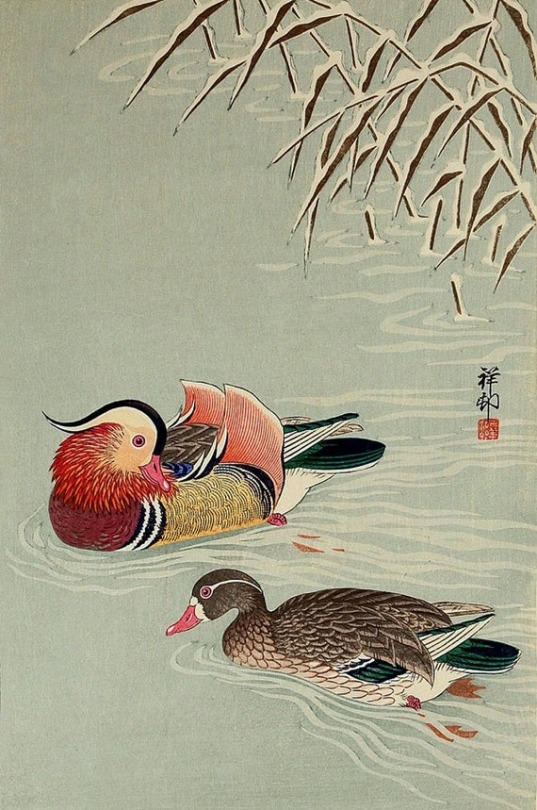
The Rear Courtyard (后庭) 🍌🍑
One popular phrase writers used, mostly towards the end of Chinese imperial history, to allude to anal sex and buttocks was “the rear courtyard” (后庭). Variations include “the pleasures of the rear courtyard” and “playing in the inner courtyard”. You will find those expressions in multiple works by Ming and Qing dynasty poets and writers.
Male Mode & Southern Mode (男風) & (南風)💨
Literally translated to “male wind” and “southern wind” they are both references to male-homosexuality. For some reason, the south of China has been more historically and culturally inclined to same-sex love than other places. We find this from the many mentions of the state of Chu in early works of literary reference to male love, in the lesbian Golden Orchid Society (金兰会) in Guangdong Province (广东省), and in the male-male marriages of Fujian province. In fact, homosexual practices were such a staple of southern Chinese provincial life that multiple writers satirized it in their works such as Qing dynasty playwright Li Yu (李漁).
And that concludes this veeeeeeeery long post. If you read all of that then, damn, you really are bored lol. But I thank you, nonetheless. I apologize if I mixed traditional and simplified Chinese characters. I tried to use traditional characters for the names to preserve their aesthetic appearance and authenticity. I will leave some of the resources I used for this post. I welcome you to take a look at them whenever you want.
With that being said, I only scratched the surface of literary references with this post. There are many, many more, however, I touched on the general ones. With how rich the male same-sex love Chinese literary field is, I cannot help but grow frustrated and tired at the lack of usage by modern Danmei/Dangai creative teams. Let’s leave the cut-sleeve to the side for a while and focus on the other awesome male-love references in Chinese literary history. Ok?
Anyways, 拜拜 👋
hunnibee26
Resources:
Birrell, A. (1982). New songs from a Jade Terrace: An anthology of early Chinese love poetry. Routledge. [Translation of Birrell of Xu Liang’s classic anthology of the same name]
Hinsch, B. (1990). The passion of the cut sleeve. Berkeley: University of California Press.
Owen, S., & Swartz, W. (Trans.). (2017). The poetry of Ruan Ji and Xi Kang. (S. M. Allen., P. W. Kroll, C. M. B. Nuget, S. Owen, A. M. Shields, X. Tian, D. X. Warner, Eds.) De Gruyter.
Stevenson, M., & Wu, C. (Eds.). (2013). Homoeroticism in imperial China: A sourcebook. Taylor & Francis.
#danmei#danmei novels#danmei adaptations#history#asian culture#chinese#chinese culture#chinese literature#male love#literature#chinese history#writers and poets#zhou dynasty#han dynasty#warring states era#2ha#meatbun doesn't eat meat#mdzs#mxtx#long post
3K notes
·
View notes
Text
Shan You Mu Xi (山有木兮) Translation Project Page
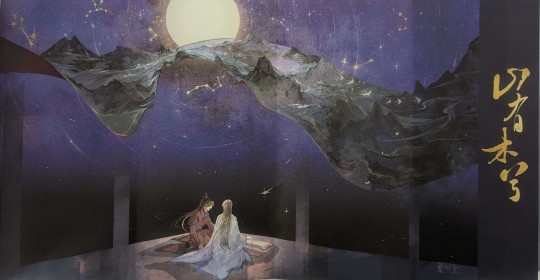
Translated by: cyrrene
Original: JJWXC by Feitian Yexian (非天夜翔)
Translations hosted on: Chickengege.org. Access requires Proof of Purchase. Please read the instructions, then fill out this form. Everyone is welcome to submit. If you have been verified in the Secret Code discord, please select Verified at the end of the first section and your form will be fast-tracked for approval.
Total Chapters: 200 (+3 extras as of now)
Other links: Glossary, Map, Character List | NU
Synopsis:
There are trees in the mountains and there are branches on the trees,
I adore you, oh! You do not know.
- from “Song of the Yue Boatman”
Hundreds of rivers converge, the thousand-mile rise of Taishan’s bluffs, and a myriad of waves surge in the Eastern Sea.
All beneath the heavens, is the extent of the ruler’s land. All within the territory of a state, are each the ruler’s subjects.
Beacons light up all over the Divine Land, danger lurks in every corner of the State of Yong.
After reuniting with Geng Shu, Jiang Heng begins to put all his effort into assisting the ruler of Yong State’s plans, but he unexpectedly falls into perilous situations time and time again. Geng Shu, who always accompanied Jiang Heng by his side, is acutely aware that the various mishaps all appear to be closely related to Jiang Heng’s past—was Jiang Heng really his own blood-related younger brother?
These two extraordinary young men wander throughout the country from state to state, experiencing trials, however, the truth obtained uncovered a cruel and unexpected past that couldn’t be erased. The lingering heroic spirits each possess their own unfulfilled long-cherished wishes. With the great Divine Land【1】 finally unified, how would they confront their own choices of the future?
The seven stars of the Northern Sky【2】 bore witness to the end of a stormy period of history,
Until the ruins once again transform into the richly ornamented tall towers of a manor.
When the blazing city lights languidly flicker,
Those people and events worth engraving into memory
Will forever be preserved within every stroke of ink in a painting of this vast expanse of rivers and mountains.
Table of Contents (Translation Progress):
*Note: Progress may show future unlinked chapters to what is currently posted. Translations for those chapters have been drafted, but final edits are pending and unreleased.
Prologue: Cry of the Qin Resounds Across the Realm (琴鸣天下)
— The blind qin master sat in the midst of the hall, playing the qin and performing the last song of his life.
001 | 002
Volume 1: Ambush from Ten Sides (十面埋伏【3】)
— While within this magnificent and eternally vast universe…sometimes, at just the slightest turn, loved ones would thereafter be separated in life as if in death.
003 | 004 | 005 | 006 | 007
008 | 009 | 010 | 011 | 012
013 | 014 | 015 | 016 | 017
018 | 019 | 020 | 021 | 022
Volume 2: Let Me Return! (归去来辞【4】)
— “If Jiang Heng is still alive, we’ll definitely meet again.”
023 | 024 | 025 | 026 | 027
028 | 029 | 030 | 031 | 032
033 | 034 | 035 | 036 | 037
038 | 039 | 040 | 041 | 042
043 | 044 | 045 | 046
Volume 3: Wild Geese Alight Upon the Sandbank (落雁平沙【5】)
— High above the city gates, that ancient bell conferred to the Ye clan by the Son of Heaven of Jin rang with a thunderous clangor. What night is tonight? The prince has returned to his country.
047 | 048 | 049 | 050 | 051
052 | 053 | 054 | 055 | 056
057 | 058 | 059 | 060 | 061
062,| 063 | 064 | 065 | 066
067 | 068 | 069 | 070 | 071
072 | 073 | 074 | 075
Volume 4: The Phoenix Seeks His Mate (凤求凰【6】) / Guangling Melody (广陵散【7】)
— People will die someday, but their torch will pass on to successors and in so doing, it will burn across the land forever. There is bound to be someone to finish what must be done.
076 | 077 | 078 | 079 | 080
081 | 082 | 083 | 084 | 085
086 | 087 | 088 | 089 | 090
091 | 092 | 093 | 094 | 095
096 | 097 | 098 | 099 | 100
101 | 102 | 103 | 104 | 105
106 | 107 | 108 | 109
Ex 1
->Volumes 5-7
Footnotes:
【1】 Shenzhou (神州) is an ancient name for China.
【2】 The Chinese constellation focused on in this novel is the Xuanwu (玄武, or Black Tortoise). It is both a god as well as a constellation in ancient China regarded as one of the four symbols. When referring to the constellation, it’s also known as the ‘seven stars of the Northern dipper’ (北斗七星).
【3】 Ambush from Ten Sides 《十面埋伏》 is the name of a classical pipa song, and is about the Battle of Gaixia when Xiang Yu was defeated by Liu Bang.
【4】 The title of Volume 2 is the name of a poem written by the poet Tao Yuanming of the Six Dynasties period when he resigned from office to live in the countryside. There is an article with a translation and more detail about it here.
【5】 There is a qin piece called 雁落平沙 “Wild Geese Alight Upon the Sandbank”, evoking the scene of thousands of wild geese calling while landing and flying off from the sandbanks.
【6】Volume 4 of the web novel and the simplified physical print have different names. The web novel version is titled after 《The Male Phoenix Seeks its Mate - 凤求凰》, a famous qin melody with lyrics that depicts one of the most well-known love stories.
【7】 The simplified physical version is named after 《Guangling Melody - 广陵散》, a well-known qin melody associated with the qin-master Ji Kang (嵇康, 223–262)) as well as the famous story of 《Nie Zheng Assassinates the Han King - 聂政刺韩王》 from the Warring States period which was inspired by a story for the same figure in Sima Qian’s《Records of the Grand Historian - 史记》.
26 notes
·
View notes
Text
Ship Meme: LongJun
Now it’s time for a danmei ship, so let’s talk about my favorite danmei ship, Li Jinglong/Kong Hongjun (Longjun) from Tianbao Fuyao Lu/Legend of Exorcism !

(lots of spoilers under the cut, so beware)
Kong Hongjun (Kong Chouxing):

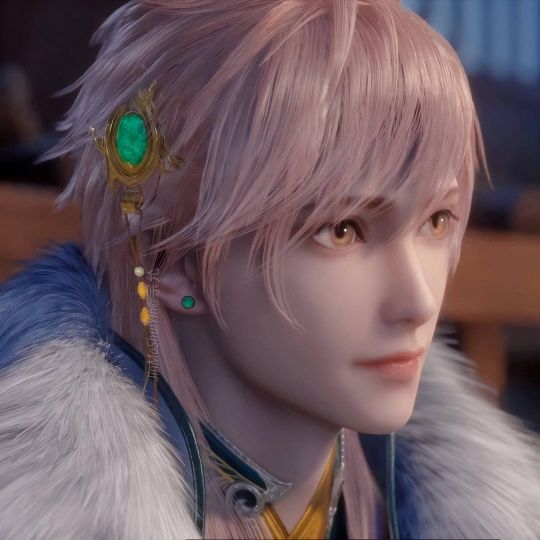
Our cutie main character (with his very different looks in manhua and donghua, but anyway, he’s adorable!). Half human and half peacock yao and raised by the phoenix yao emperor Chong Ming, Hongjun is sent off to Chang’an to give the Heart Lamp to the Chen family descendant and to figure out the mystery of his father’s death. Things don’t go quite according to plan, but he joins the newly created Exorcist Department, solves mysteries, learns about the world, fights yao, matures and discovers more about himself, and falls in love.
As a protagonist, I really love Hongjun because he’s adorable (and a glutton) but also because throughout the series, you get to see him gradually grow up and mature, to the point that it becomes him supporting Li Jinglong when all seems lost, and eventually becoming yao emperor himself. He’s a badass little cutie who I only want good things for!
Li Jinglong:


Our secondary protagonist in many ways, Zhangshi of the Exorcism Department, the always unlucky Li Jinglong.
Li Jinglong is a guy who works extremely hard and is extremely smart and strategic, but he’s also extremely unlucky, so many situations tend to blow up in his face. (Like the first time he and Hongjun run into each other in the streets of Chang’an after Hongjun arrives on a mission...) Still, for all that, he is the one who leads the team and gives them direction, and he also has a VERY soft, sappy side for a certain half-yao cutie :DDDD (The man got a peacock feather tattoo over his heart before even confessing, he has it SO BAD with or without his memories of their childhood).
What I especially like about him though is that he is always so encouraging with Hongjun, always explaining things to him, and always telling him that “No, you’re not dumb, you just haven’t seen much of the world yet” when Hongjun feels kind of stupid. He is Hongjun’s biggest fan (Chong Ming may disagree, but anyway), and of course, when he gets to his weakest point and thinks that he’s completely useless to the team, he leans on Hongjun, and the two of them manage to get through it together.
Which now brings us to....
Longjun:
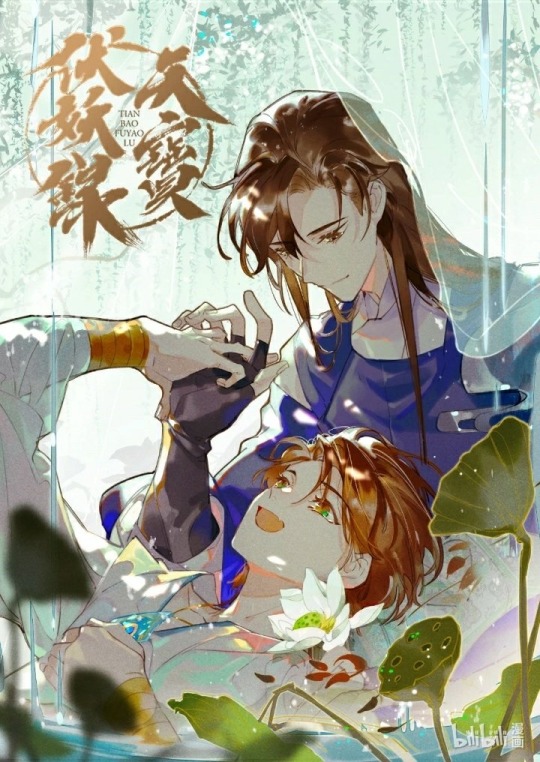


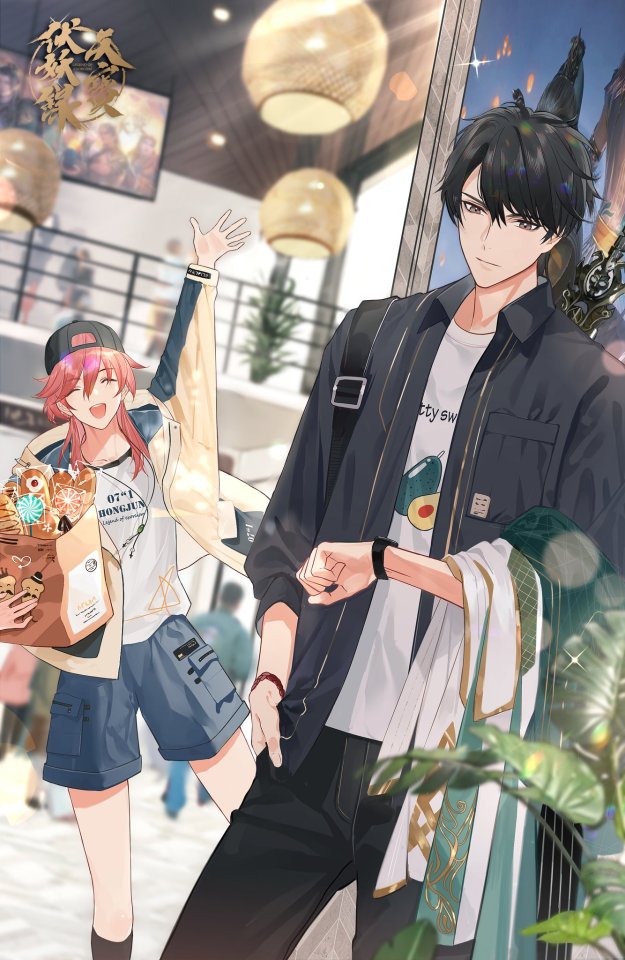
They’re so sweet??? They definitely hit all my favorite childhood friends vibes because yes, they were childhood friends who basically promised to marry each other when they were tiny, but of course, due to everyone hunting down Mara, Hongjun’s parents died, Hongjun was de-aged by two years (which is why originally they were only 2 years apart in age, but now they’re 4), and all of their memories were wiped. Still, they managed to find each other again and fall in love all over again, and they are SO devoted to one another.
Li Jinglong sings the whole Song of Yue Boatman to Hongjun to confess to him! He climbs a mountain to get to him! He buys food constantly for this boy who has a black hole for a stomach! Hongjun doesn’t want to go back to Yaojin Palace as soon as he thinks of Li Jinglong alone in the exorcist department! He constantly fights to protect Li Jinglong! Even when he doesn’t understand his own feelings, he tries to figure it out, for both his and Li Jinglong’s sakes!
Li Jinglong will do anything in his power to keep Mara from taking Hongjun over, and Hongjun will make sure that no one bad mouths or hurts his Zhangshi even Li Jinglong himself.
Which is not to say that everything is roses in their relationship: after all, there’s the big thing of Li Jinglong inadvertently causing the entire incident that led to the death of Hongjun’s parents, Hongjun having the seed of Mara within him, and Li Jinglong very insecure over his position on the team if he has neither the Heart Lamps or his planning skills with him.
And in the end, they do manage that! And even adopt a son! It’s all very cute (and they totally deserve it after all the pain it took to get them to that happy ending).
But juu, why are they your favorite danmei ship?
I guess it’s because with Tianbao, we get to watch both of them gradually grow and mature together. Hongjun is the most obvious since he starts the series at just 16, but Li Jinglong also matures as time goes by and learns that his worth is not just in how useful he can be to everyone and to rely on others. Also, they’re childhood friends who managed to meet again, and I eat that stuff up with a spoon.
But juu, what about Langlu??? Why aren’t you writing about them????

Of course I love Mo Rigen/Lu Xu! I didn’t write 2 whole fics about them for nothing! And I will admit that they were the pairing that made me start reading Tianbao, but Longjun is what made me stay, and if I have to pick a favorite pairing in Tianbao, then it’s Longjun even with tsundere Lu Xu. It helps that Longjun gets together relatively early in the series, at the end of volume 2, while Tianbao Langlu are a mess until almost the end of the series, so you get to see Longjun as an established couple for way longer than for Langlu.
This entire series sounds super interesting, but where can I read it, juu?
So of course there’s the original jjwxc raws and a guide on how jjwxc works, and there’s the ongoing English translation by moon over on ChickenGege that I’m helping with. If you want to read the manhua, Bilibili has an English site, but ChickenGege (which is the official team Bilibili is using) also posts it on their site. Season 1 of the donghua is on Netflix, and probably season 2 will be up there soon too, since Bilibili just announced that season 3 is coming out soon!
juu, which adaptation do you like best?
So of course I like the original novel best since that has the most detail, but the manhua and donghua are really nice too! I love the manhua artist’s style (she’s also doing the I Ship My Rival x Me manhua too), and the donghua really went all in on their 3D animation budget. Of course, sadly, the manhua and donghua is more censored, while the novel (as long as you get the uncensored traditional version or the old raws before jjwxc clamped down) was written before JJWXC really started clamping down, so it’s way more explicit about the romances.
So I hope you guys enjoyed my little ramble about Longjun, and if you’ve never checked out Tianbao before, you really should! It’s a great novel with tons of humor, adventure, angst, heartwarming moments, and romance!
120 notes
·
View notes
Text
youtube
THIS IS GIVING ME SHIVERS SEND HELP
(it is the yue boatman song ;A; being irish i can never resist a song about a boatman 😔👌)
#song of the yue boatman#越人歌#music#chinese music#chinese chorus#beijing queer chorus#good for them ;A;#such beautiful voices omg ;A;#birb still says#Youtube#THERE'S ALSO A VERSION BY A MAN LITERALLY CALLED 'NAN FENG'??????#he writes it 南枫 tho lol i think THAT feng means maple tho#what a pretty name ;A;
7 notes
·
View notes
Text
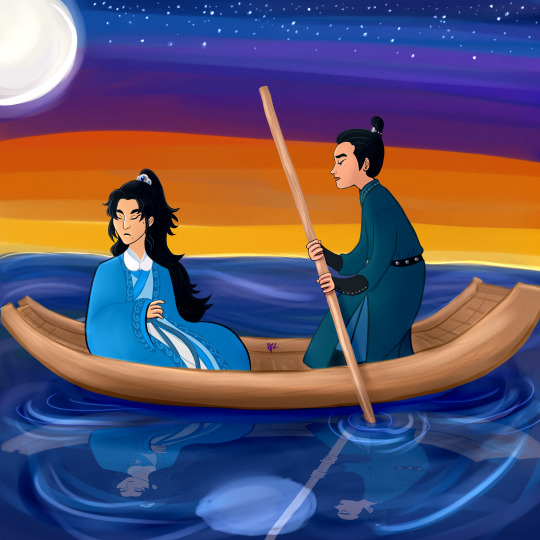
AND FINALLY TIS DOOOOONE!!!!
please listen to this version of the yue boatman song~ they are all beautiful but this one strikes me as the most ying'er version lol. i hope u will like it~~~~ 😊💚💚
lol it took aaaages and i was giving out while drawing this so my mam goes 'well let me see, do i know them??' and i showed her zzs and said 'yes u remember him from our show right??' and she goes 'OH!!! yes it's whxhkhshshhsh! :D' (which is her attempt at saying 'wen kexing') and i was like 'no.....it's. it's the other one :'D' and she goes 'I KNOW!! u know what i MEANT!!! has it been long enough to watch the show again yet?? 🥺🥺🥺'
so now we're doing a woh re-watch soon i guess lmao 🤣🤣
#birb still draws#hanzhou#zhou zishu#han ying#we decided to just go with a hanzhou for this one hope that's all right~~~#poor motherrrr ;A; she tries SO HARD to say their names but she really can't#we practised together BEFORE watching the show#i showed her the characters AND the pinyin#but she just can't get the hang of it rip 😔#woh#shl#word of honour#word of honor fanart#shanhe ling#山河令#woh fanart#shl fanart#is this still an art blog?#special thanks to zongzhu for helping me with the shading and stargrit for helping me with ~artistic decisions~#u lot are the bestest EVAR 🥺🥺🥺
39 notes
·
View notes
Text
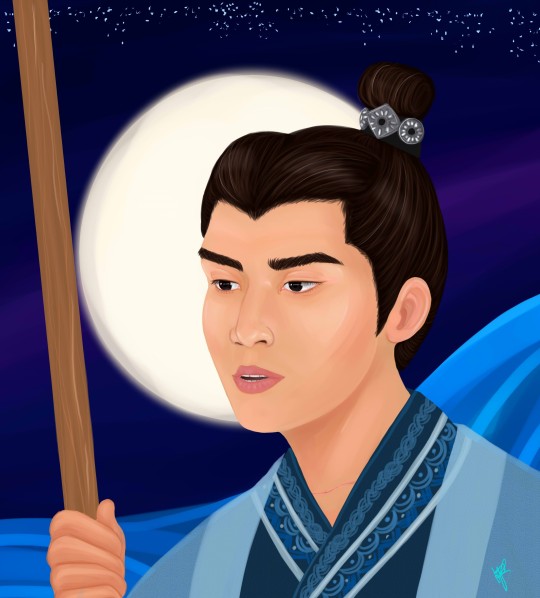
ying'er the boatman~
this was my original plan for the yue boatman song inspired drawing, but then i had a second idea and decided to go with that instead. AND THEN THE NECK SCAR THING. so i finished this one as well 😅
(looking at it now tho, it could almost be a tarot card design lmao 🤣 oh well 🤣)
#birb still draws#han ying#ying'er#YING'ER LOVERS COME HITHER#woh#shl#woh fanart#shl fanart#word of honor#shanhe ling#山河令#is this still an art blog?#i knowwwww it's not perfect but i think it's quite nice anyway!!!#not as interesting as the other tho lmao#this is just my usual 3/4 portrait lmfao 🤣🤣
32 notes
·
View notes
Text
i FUCKING LOVE THIS ONE AS WELL
youtube
HOW AM I JUST SUPPOSED TO GO ON WITH MY LIFE, KNOWING THAT THIS SONG ExISTS AND THAT I CAN'T BE LISTENING TO IT MY EVERY WAKING MOMENT
HOW
youtube
THIS IS GIVING ME SHIVERS SEND HELP
(it is the yue boatman song ;A; being irish i can never resist a song about a boatman 😔👌)
#song of the yue boatman#越人歌#music#chinese music#chinese chorus#beijing queer chorus#good for them ;A;#such beautiful voices omg ;A;#birb still says#Youtube#THERE'S ALSO A VERSION BY A MAN LITERALLY CALLED 'NAN FENG'??????#he writes it 南枫 tho lol i think THAT feng means maple tho#what a pretty name ;A;#the second one is by quan zhou#what a beautiful voice oh my goddd#U LOT I AM. FUCKING DYING HERE#AM NOT OK#BIRB IS HAVING PALPITATIONS#Y'ALL WHAT IF#WHAT IF WE MADE IT HANZHOU THO#OR HANWENZHOU#WHATEVER LET'S JUST PUT BLORBOS ON IT PLS ;A;
7 notes
·
View notes